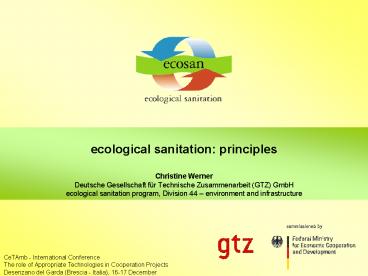ecological sanitation: principles PowerPoint PPT Presentation
1 / 17
Title: ecological sanitation: principles
1
ecological sanitation principles
- Christine Werner
- Deutsche Gesellschaft für Technische
Zusammenarbeit (GTZ) GmbH - ecological sanitation program, Division 44
environment and infrastructure
CeTAmb - International Conference The role of
Appropriate Technologies in Cooperation
Projects Desenzano del Garda (Brescia - Italia),
16-17 December
2
world water and sanitation crisis
ecosan principles
- Increasing scarcity and degrading quality of
freshwater - 1.1 billion people around the world have no
access to safe drinking water - 2.4 billion people have inadequate sanitation
and/or no means of wastewater disposal - Expected growth of the global population by
another 2 billion people within the next 25 years
needing sanitation - 90 of wastewater worldwide is either poorly
treated or not treated at all at discharge - 80 of all diseases and 25 of all deaths in
developing countries can be attributed to
polluted water (WHO)
3
millenium development goals (MDGs)
ecosan principles
- Achievement of poverty eradication and
sustainable development by rapidly increasing
access to basic requirements such as clean water,
sanitation, energy, health care, food security
and the protection of biodiversity - Set target for water and sanitationTo halve
the proportion of people without access to safe
drinking water and to adequate sanitation by 2015
4
shortcomings of conventional water carriage
sanitation
ecosan principles
5
shortcomings of conventional water carriage
sanitation
ecosan principles
- Unsatisfactory purification or uncontrolled
discharge of more than 90 of wastewater
worldwide - Severe water pollution, unbearable health risks
- Consumption of precious water for transport of
waste - High investment, energy, operating and
maintenance costs - Frequent subsidization of prosperous areas and
neglect of poorer settlements - Loss of valuable nutrients and trace elements
contained in excrements due to discharge into
waters - Problems with contaminated sewage sludge in
combined, central systems - Linear end-of-pipe technology
6
shortcomings of conventional drop and store
sanitation
ecosan principles
7
closing the loop between sanitation and
agriculture
ecosan principles
rainwater harvesting
restoring soil fertility
food
agricultural use
organic waste
greywater
faeces
urine
treatment / hygienization / energy recovery
water reuse
no waste disposal in water bodies
8
ecological sanitation - a new approach
ecosan principles
- Improvement of health by minimizing the
introduction of pathogens from human excrements
into the water cycle - Promotion of safe recovery and use of nutrients,
organics, trace elements, water and energy - Preservation of soil fertility and improvment of
agricultural productivity - Conservation of resources
- Preference for modular, decentralised systems for
more appropriate, cost-efficient solutions - Promotion of a holistic, interdisciplinary
approach - Material flow cycle instead of disposal
9
ecosan principles
cco-sanitation concepts and strategies
- eco-sanitation
- is not a specific technology, but a new
philosophy - based on an eco-system-oriented view
of material flows - of dealing with what is
presently regarded as waste and wastewater for
disposal - considers human excreta and wastewater not as
wastes but as natural resources - applies the basic natural principal of closing
the loop by using modern and safe sanitation and
reuse technologies - opens up a wider range of sanitation options
than those currently considered.
10
composition of household wastewater
Introduction to ecosan
10.000 200.000 l
50 l
500 l
source Otterpohl
Volume Liter / (Personyear)
11
wastewater and excreta are a valuable resource
ecosan principles
- farmers around the world yearly require 135 Mio
tons of mineral fertiliser for their crops, while
at the same time conventional sanitation dumps 50
Mio tons of fertiliser equivalents from so called
wastewater flows into our water bodies -
nutrients with a market value of around 15
Billion US dollars.
12
fertilizer potential of human excreta
ecosan principles
source Drangert, 1998
13
WHO guidelines for agricultural use of treated
water (1989)
ecosan principles
14
benefits of ecological sanitation
ecosan principles
- safe sanitation
- water savings and a healthy environment
source www.virtualmuseum.ca
source Johannes Heeb
ecosan-toilets in Bangalore, India
15
Benefits of ecological sanitation
ecosan principles
- improved soil quality through reuse of organics
- restored soil fertility through nutrient reuse
faeces urine
none
urine
source Petter Jenssen
compost improved soil
source Vinnerås, 2003
untreated soil
after one week without water
16
benefits of ecological sanitation
source Petter Jenssen
- recovery of energy content (covering about 20
of cooking energy needs for a typical family in a
developing country) - energy savings in fertilizer production
wastewater treatment
- reuse of water
17
- Thank you!
- www.gtz.de/ecosan
- ecosan_at_gtz.de
- subscribe the ecosan-newsletter by sending an
e-mail with the text subscribe ecosan
tomajordomo_at_mailserv.gtz.de

